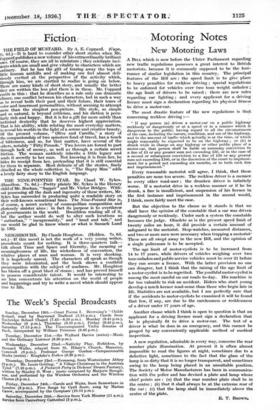Fiction
THE FIELD OF MUSTARD. By A. E. Coppard. (Cape. 7s, 6d.)—It is hard to consider other short stories when Mr. oppard publishes a new volume of his extraordinarily brilliant ones. Of course, they are all in miniature ' • they celebrate inci- dents which are small and give vitality to characters which are ordinary. But he has the gift of tearing away the tops of little human anthills and of making one feel almost deli- riously excited at the perspective of the activity which, through him, we are startled to realize is going on below. There are many kinds of short story, and usually the better they are written the less plot there is in them. Mr. Coppard excels in this : that he describes as a rule only one dramatic climax, one conflict between his characters, but in such a way as to reveal both their past and their future, their tones of voice and innermost personalities, without seeming to attempt more than the simplest pen-picture. His style, so simple and so natural, is beyond criticism, and his diction is pecu- liarly rich and happy. But it is for a gift far more subtle than technical dexterity that he deserves highest appreciation. That is his ability, while relating the most everyday matters, to reveal his worlds in the light of a serene and creative beauty. Of the present volume, ` Olive and Camilla," a story of the companionship of two spinsters fond of travel, has a touch of bitterness, and so, for that matter, have several of the others, notably "Fifty Pounds." Two lovers are forced to part through lack of money, as well as through a certain secret friction. The woman suddenly inherits a little legacy and sends it secretly to her man. Not knowing it is from her, he hides its receipt from her, pretending that it is still essential for them to separate. Most delicate of all the stories, finely chiselled as the whole collection is, " The Bogey Man " adds a lovely fairy story to the English language.










































 Previous page
Previous page